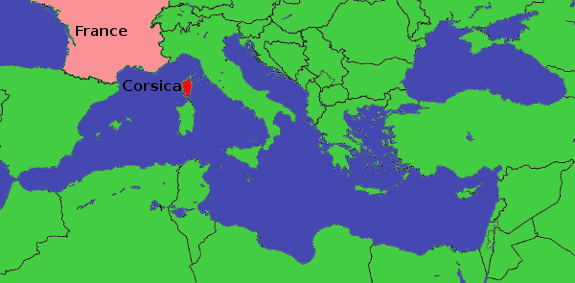
Circle the area on this map

D. The island’s indigenous people were conquered and ruled by many different groups in the ancient world. The Romans considered Corsica as one of the most backward regions of their world. The island produced sheep, honey, resin and wax and slaves.
C. Corsican is a vernacular Italian dialect related to what was spoken in the Tuscany region of central Italy.
B. Napoleon was born on Corsica in 1769 and joined the French army where his military successes ultimately led him to become the first Emperor of the French in 1805.
A. Metropolitan France consists of mainland France and its nearby European islands, including Corsica. Overseas France includes islands in the Atlantic, Pacific and Indian oceans as well as French Guiana in South America.